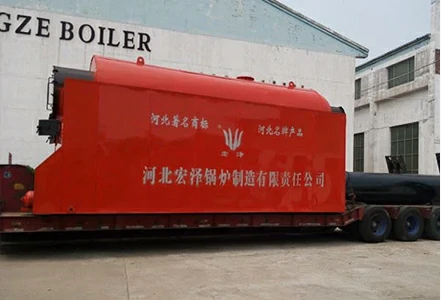
10 сар . 07, 2024 03:36 Back to list
natural gas fired steam boiler
Natural Gas Fired Steam Boiler Efficiency and Environmental Benefits
Natural gas fired steam boilers play a pivotal role in various industries by providing efficient and reliable steam generation. These boilers burn natural gas to produce steam, which is then used for a variety of applications, including heating, power generation, and industrial processes. The popularity of natural gas fired steam boilers is largely due to their efficiency and environmentally friendly operation compared to other fossil fuel-based systems.
One of the primary advantages of natural gas fired steam boilers is their high thermal efficiency. Modern designs can achieve efficiencies above 90%, which minimizes fuel consumption and costs. This efficiency is primarily attributed to advanced combustion technologies and heat recovery systems. The boilers utilize natural gas, which burns cleaner than coal or oil, producing fewer emissions and waste products. This makes them an attractive option for industries looking to reduce their carbon footprint and comply with stringent environmental regulations.
Moreover, natural gas itself is a relatively abundant and cost-effective energy source in many regions. The infrastructure for natural gas is well-established, facilitating easy access for industries to utilize this fuel. As global efforts intensify to shift towards cleaner energy solutions, natural gas is often seen as a bridge fuel that can aid in transitioning from more polluting fuels to renewable energy sources.
natural gas fired steam boiler

In terms of operation, natural gas fired steam boilers are known for their flexibility and responsiveness. They can quickly ramp up and down to meet fluctuating steam demands, making them ideal for use in industries with variable operating schedules. This adaptability is beneficial in processes where precise control over steam temperature and pressure is critical.
Another significant benefit is the reduced maintenance requirements associated with natural gas fired steam boilers. Compared to other combustion systems, these boilers typically experience less wear and tear due to lower combustion temperatures and reduced soot production. This not only extends the lifespan of the equipment but also reduces downtime and operational costs.
Despite the many advantages, it is essential to consider the limitations of natural gas. As a fossil fuel, it contributes to greenhouse gas emissions, albeit at a lower rate than coal or oil. The extraction and transportation of natural gas can also pose environmental risks, including methane leaks. To address these concerns, industries are encouraged to implement best practices in gas management and explore carbon offset initiatives.
In conclusion, natural gas fired steam boilers represent a viable and efficient option for industrial steam generation. Their high efficiency, lower emissions, and flexible operation make them a preferred choice for many sectors. As the world moves toward more sustainable energy solutions, the role of natural gas is likely to evolve, yet its current benefits indicate that it will remain a critical component of industrial applications for years to come. By optimizing their use and investing in technology that reduces environmental impact, industries can leverage natural gas fired steam boilers to achieve both operational excellence and sustainability goals.
-
Efficient Biomass Fired Hot Water Boiler | AI Heating Solution
NewsAug.01,2025
-
High-Efficiency Gas Thermal Oil Boilers | HPT Models
NewsJul.31,2025
-
Oil Fired Hot Water Boilers Sale - High Efficiency & Affordable
NewsJul.31,2025
-
High-Efficiency Commercial Oil Fired Steam Boiler for Industry
NewsJul.30,2025
-
High-Efficiency Biomass Fired Thermal Oil Boiler Solutions
NewsJul.30,2025
-
High Efficiency Gas Fired Thermal Oil Boiler for Industrial Heating
NewsJul.29,2025
Related PRODUCTS






















